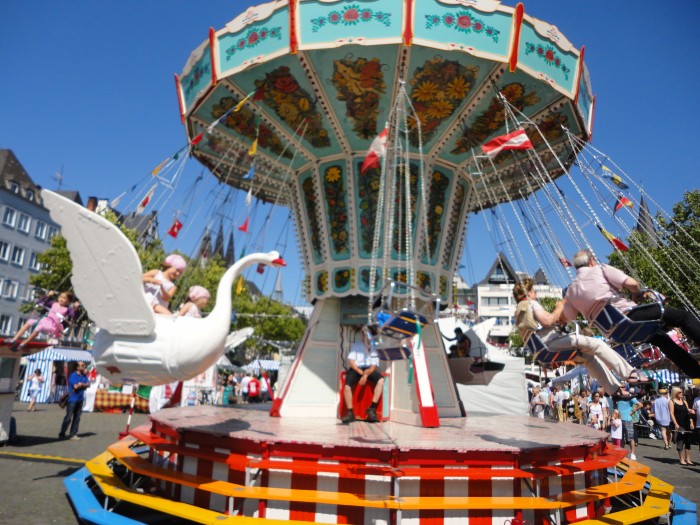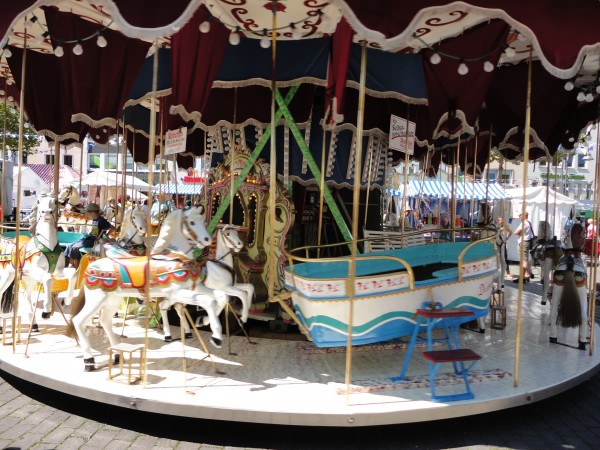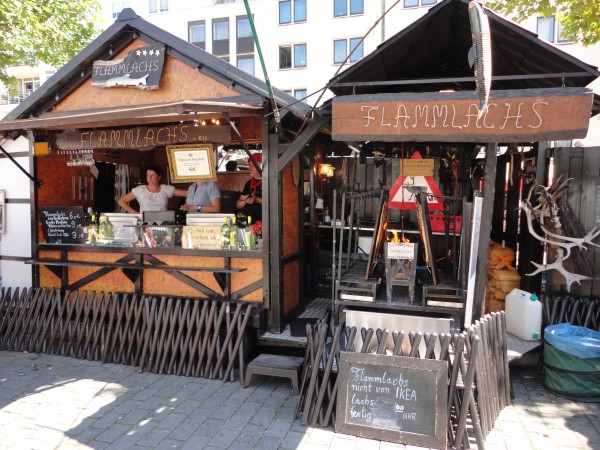Germany is full of fun stuff to do in the summer months. Almost every city, town and village has its own version of some kind of festival celebrating all sorts of obscure events. It might be a Stadtfest, which is a City Festival (pronounced STAHT-fest), or a Weinfest (pronounced VAIHN-fest) which is, of course, a Wine Festival or it might be a Kerwe (pronounced KAIR-fuh), sometimes called Kerb, depending on the area you’re in.
But what is a Kerwe? It’s a local word derived from Kirchweih, a term originating in the Middle Ages meaning Parish Fair, a religious festival organized by a local Christian church. Different regions of Germany and adjacent countries use variations of this word. In Saarland, for example, they call it a Kerb (pronounced KAIRB).
Nowadays, religious overtones have been all but lost, so it really only refers to an old-fashioned local fair anymore.
Kerwe is truly a family event and a lot of fun for all ages. Big cities tend to have a larger venue with more variety, but small Kerwes are also interesting and fun. No matter the size, they always have rides for kids and usually adults. Generally, the rides are on a slightly smaller scale than you might experience at an amusement park. Merry-go-rounds and ferris wheels are common while larger Kerwe might also offer roller coasters.
You can expect all kinds of food, most of it made after regional recipes, giving the Kerwe in different locations a slightly different taste. Of course you can always get Wurst or sausages (pronounced VOORST), usually served with an undersized piece of bread which doesn’t at all fit the shape of the sausage and a choice of mustard or ketchup. You will also find an assortment of other German grilled specialties, many of which are quite delicious.
Cotton candy, chocolates, and a myriad of other German specialties will also not be missing. Popcorn is always available as well but don’t be surprised when you find out that it is seasoned with refined sugar, not salt. For me, this took some getting used to but I suppose it’s part of the cultural experience.
There will also be beer stands, wine stands and others serving only cocktails, the latter having become much more popular in the last decade.
Sometimes you can purchase souvenirs, generally arts and crafts, too. These make for cute presents to give to your family or your friends back at home.
Kerwe typically start during the day and continue into the evening and usually last for an entire weekend, mostly Friday through Monday, although opening times and durations might vary a little. Kerwe season tends to start in April with the last festivities happening in September or even October. It is not a travelling fair but every city/town is assigned a different date to make sure visitors don’t need to pick one of multiple locations and there is always one to go to on any given weekend.
Entry is always free; you just pay for what you eat and drink plus the costs of rides and any kind of souvenirs you might not be able to live without! The Kerwe are a relatively inexpensive and fun way to enjoy summer and get an appreciation for a little German culture!
Keep your eyes on our Event Calendar for a Kerwe near you!


